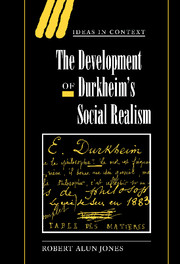Book contents
- Frontmatter
- Contents
- Acknowledgments
- Note on texts and references
- Introduction: sociology and its history
- Chapter 1 The reform that contained all other reforms
- Chapter 2 The subtlety of things
- Chapter 3 The perfection of personality
- Chapter 4 A l'école des choses
- Chapter 5 The yoke of necessity
- Conclusion: sociology and irony
- List of references
- Index
- Ideas in Context
Introduction: sociology and its history
Published online by Cambridge University Press: 22 September 2009
- Frontmatter
- Contents
- Acknowledgments
- Note on texts and references
- Introduction: sociology and its history
- Chapter 1 The reform that contained all other reforms
- Chapter 2 The subtlety of things
- Chapter 3 The perfection of personality
- Chapter 4 A l'école des choses
- Chapter 5 The yoke of necessity
- Conclusion: sociology and irony
- List of references
- Index
- Ideas in Context
Summary
This book has two main goals. The first is to explore the meaning and significance of the constellation of ideas in Durkheim's work that is often characterized as his “social realism” – i.e., the view, epitomized in Les Règles de la méthode sociologique (1895), that social phenomena should be studied comme des choses, as real, concrete things, subject to the laws of nature and discoverable by scientific reason. The second, subsidiary goal is to exemplify a particular way of thinking and speaking about the history of sociological theory, one that might best be described as “historicist,” “nominalist,” and/or “pragmatist.” For me, the first goal has always been the most important. But since so much of what I have to say about Durkheim presupposes some grasp of my views on sociology and its history, this introduction will begin with a brief explanation of the second.
In a famous essay published in 1984, Richard Rorty suggested that we think of the history of ideas as comprising different kinds of “conversations” that we imagine and reconstruct, sometimes between ourselves and classic writers of the past, and sometimes among the classic writers themselves. In “rational reconstructions,” for example, we imagine and then converse with an “ideally reasonable and educable Durkheim” – e.g., the Durkheim who speaks our language, who might be brought to describe himself as having overstated the “objectivity” of social facts, the “normality” of crime, or the “pathology” of the forced division of labor.
- Type
- Chapter
- Information
- The Development of Durkheim's Social Realism , pp. 1 - 8Publisher: Cambridge University PressPrint publication year: 1999



